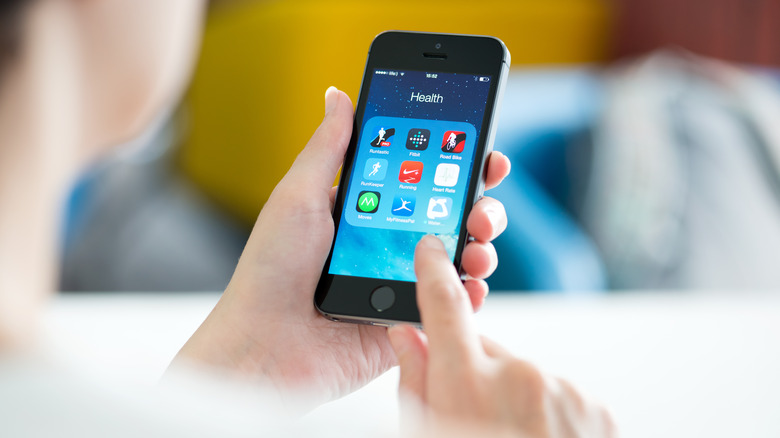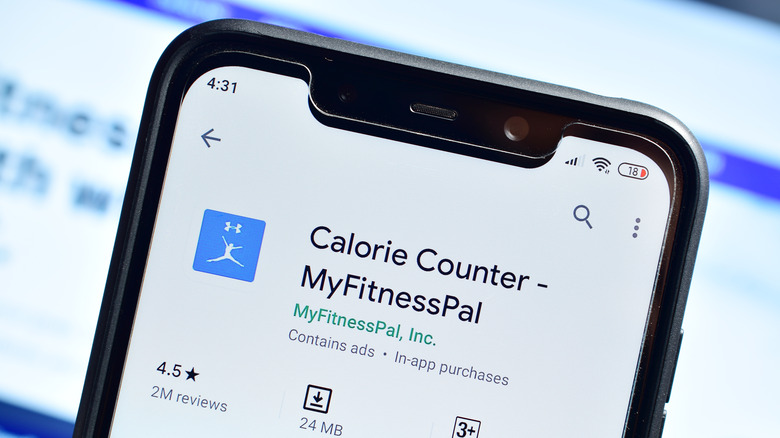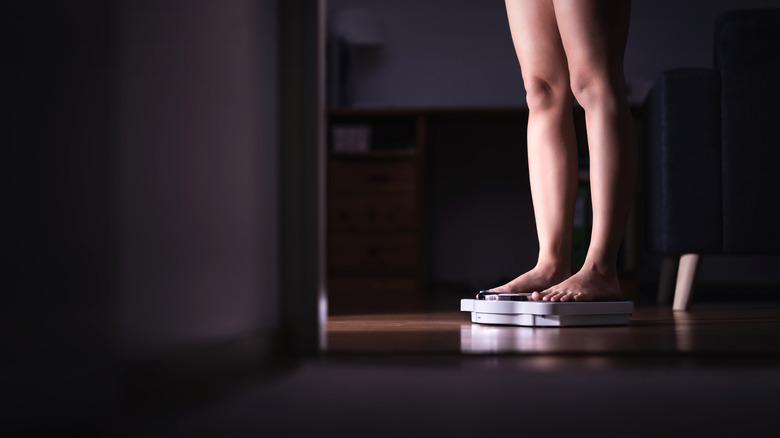Why You Probably Shouldn't Rely On Apps For Nutritional Advice
Dieting is nothing new, but the ways we approach it have changed. The word itself can be traced back to the ancient Greek 'diaita,' which referred to a comprehensive way of life rather than food alone, per The Atlantic. In its original context, diaita encompassed food, drink, exercise, and overall lifestyle choices, addressing all aspects of physical and mental health. However, it seems that humans' obsession with weight loss was prevalent even then. According to the Los Angeles Times Daily Pilot, Hippocrates in the 4th century B.C. recommended a diaita that involved eating soft foods, manual labor, slow running, wrestling, seawater enemas, and regular vomiting. The issues here should be self-evident.
In the centuries since our technology and medical knowledge have steadily advanced, but our concept of diet has taken an ever narrower approach, becoming completely food-centric. The latest trend in dieting comes in the form of apps that track your food intake, such as MyFitnessPal, Lose It!, and Fooducate (via ScienceDirect). These help users visualize their eating habits through graphs, diagrams, and progress tracking, and their cheap and accessible nature is excellent for those who cannot access a specialized dietitian. However, solely relying on these apps to determine your diet and lifestyle choices is insufficient and may do more harm than good to certain individuals. Before committing to such an app, you must understand its limitations.
Questions of efficacy
The biggest problem with nutrition apps is the narrow scope of their focus. While a few apps incorporate further lifestyle advice regarding exercise, stress, and mindfulness, the majority focus solely on the food you eat, particularly scrutinizing your calorie intake (via ScienceDirect). It is a mistake to equate caloric restriction with healthy eating. Physician Ann Kulze told WebMD that low-calorie diets are "almost starvation-based" and therefore unsustainable. In the same article, registered dietitian Geri Brewster said we cannot treat all types of calories the same and need to count individual nutrients separately, limiting carbohydrates and sugars while adding more protein.
Another criticism leveled at dietary apps is that they are great for logging information about your eating habits but don't translate that information into actionable change. In a study of 200 Los Angeles residents using MyFitnessPal, most patients stopped using the app after one or two months, per CBS. Alex Hern, writing for The Guardian, reviewed his experience with MyFitnessPal, saying that he quickly got in the habit of logging his meals but didn't get sufficient motivation or knowledge to actually change his diet. On the other hand, one Lose It! user told Hern that simply knowing his calorie intake was sufficient to motivate him. It's clear that these solutions aren't universally effective and rely on making assumptions of the user.
Apps can exacerbate eating disorders
Serious concerns have been raised in the medical community about the impact calorie counting apps can have on people with a history of eating disorders. A 2021 study published by Cambridge University Press assessed how patients with eating disorders respond to meal-tracking apps and found that such apps trigger and exacerbate symptoms. For starters, these apps demand everyday use and frequently send notifications reminding users to input their meals, which can encourage obsessive thinking about food. Patients were quoted saying that fitness apps harmed their overall mental health, citing increased anxiety attacks and symptoms of Obsessive Compulsive Disorder (OCD).
The study also criticizes diet and fitness apps for fixating too much on numbers, quantifying every choice the user makes. One patient was quoted saying that this approach led her to think of food as a numbers game, stating, "It's definitely very, very triggering to be tracking it all the time." The researchers conclude by recommending improvements to fitness apps, including reducing push notifications, promoting a varied diet, and incorporating other aspects of health.
If you are struggling with an eating disorder, or know someone who is, help is available. Visit the National Eating Disorders Association website or contact NEDA's Live Helpline at 1-800-931-2237. You can also receive 24/7 Crisis Support via text (send NEDA to 741-741).
Better solutions
The most knowledgeable source for diet and fitness advice is a registered dietitian nutritionist (RDN), which should not be confused with a nutritionist. Medical News Today explains that all dietitians in the United States must obtain a certification from the Academy of Nutrition and Dietetics, which requires they pass a standardized exam and complete 1,200 hours of supervised practice. Dietitians can help you devise a meal plan, and they are qualified to treat specific conditions such as eating disorders. On the other hand, nutritionists are not required to be certified in all states.
Unfortunately, a registered dietitian may not be accessible to everyone due to regional or financial reasons, as noted in ScienceDaily. The convenient and affordable nature of apps is far more accessible. Those who choose to use food and fitness trackers could benefit from the suggestions posed in the study by Cambridge University Press: eat a varied diet, don't over-fixate on numbers, and don't be afraid to take a break if you need to.



